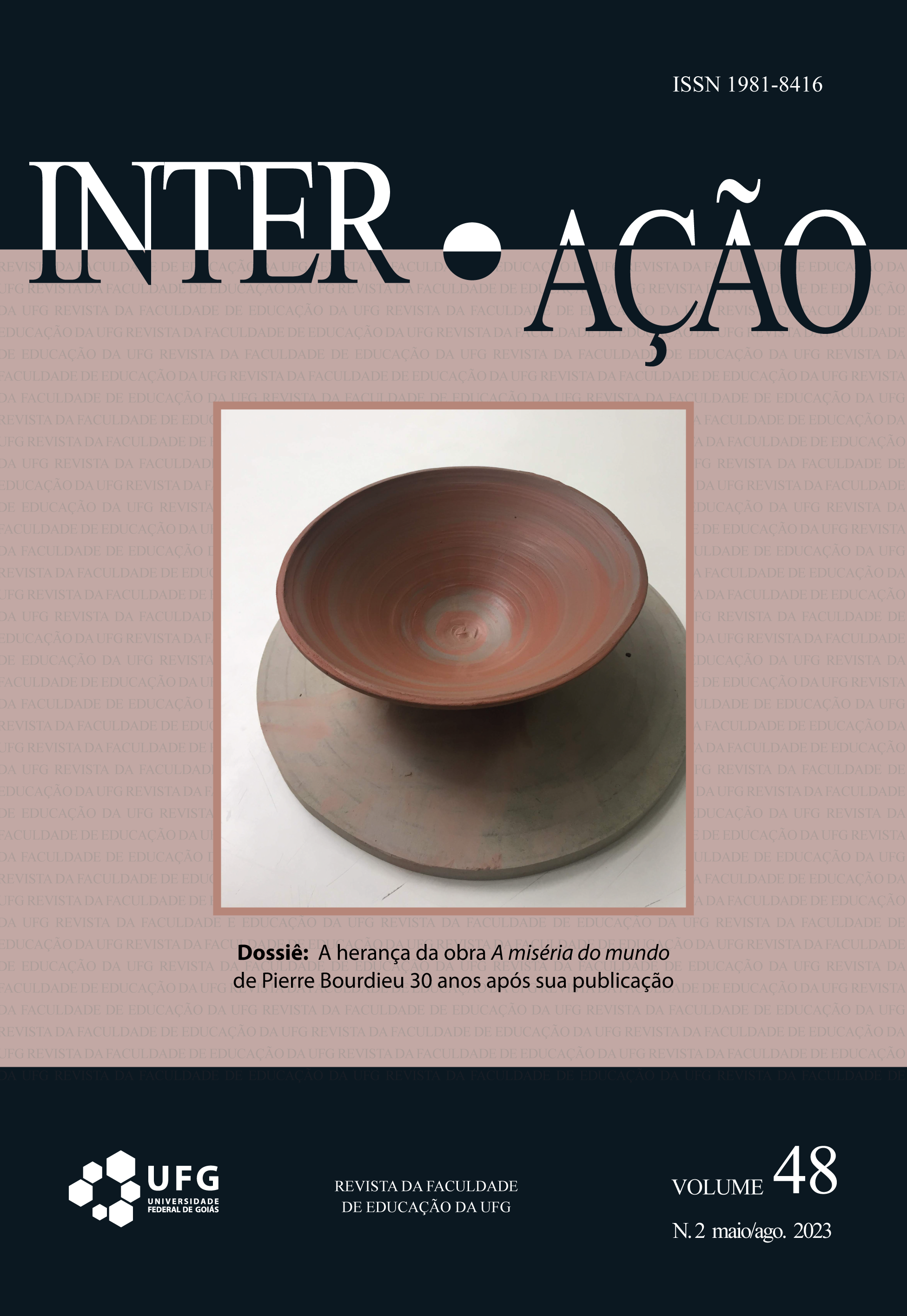QUALITY, e-CITIZENSHIP AND DISTANCE EDUCATION: A POSSIBLE RELATIONSHIP
DOI:
https://doi.org/10.5216/ia.v48i2.77113Palavras-chave:
Distance Education; e-Citizenship; Socially Referenced Quality.Resumo
This study is part of a national and international research network on the regulation and quality of distance education (EaD) and aims to understand and relate e-citizenship to quality as an important element in ensuring the development of EaD from a socially referenced perspective. To this end, a bibliographic survey was conducted in the international repository Education Resources Information Center (ERIC), considering the period 2019-2023. It was concluded that the inclusion of e-citizenship as one of the indicators of socially referenced quality in distance education is relevant, due to the similarity of their concepts and purposes in the training of emancipated professional citizens.
Downloads
Referências
ACOSTA, Alejandra; PALMER, Iris; ROMO-GONZÁLES. Back to basics – quality in digital learning. Washington DC: New America, 2021. Available at: https://www.newamerica.org/education-policy/reports/back-to-basics/. Accessed on: nov. 20, 2022.
BRASIL. Lei nº 9.394, de 20 de dezembro de 1996. Estabelece as diretrizes e bases da educação nacional. Brasília, DF: Presidência da República, Casa Civil, Subchefia para Assuntos Jurídicos, 1996. Available at: https://www.planalto.gov.br/ccivil_03/Leis/L9394.htm/. Accessed on: feb. 15, 2021.
CARPENTER, J. P. Digital Citizenship in the Curriculum. Educational Leadership, [s. l.], v. 75, n. 3, p. 50-55, 2017. Available at: https://www.ascd.org/el/articles/digital-citizenship-in-the-curriculum. Accessed on: oct. 10, 2021.
DOURADO, L. F.; OLIVEIRA, J. F. de. A qualidade da educação: perspectivas e desafios. Cad. Cedes, Campinas, SP, v. 29, n. 78, p. 201-215, 2009.
DUNAWAY, Mary; MACHARIA, Mary. The Effect of Digital Citizenship on Negative Online Behaviors and Learning Outcomes in Higher Education. Journal of Information Systems Education, [s. l.], v. 32, p. 294-307, 2021. Available at: https://jise.org/Volume32/n4/JISE2021v32n4pp294-307.html. Accessed on: dec. 20, 2022.
FLYNN, C. F. Facilitating civility in Distance Education. In: SETZEKORN, K.; PATNAYAKUNI, N.; BURTON, T. (Eds.). Socioeconomics, Diversity, and the Politics of Online Education. Hershey, PA: IGI Global, 2020. DOI:https://doi.org/10.4018/978-1-7998-3583-7. Available at: https://www.igi-global.com/gateway/book/243483. Accessed on: dec. 6, 2022.
FREIRE, P. Pedagogia da esperança - um reencontro com a Pedagogia do Oprimido. 11. ed. Rio de Janeiro: Paz e Terra, 1992.
FREIRE, P. Pedagogia da autonomia: saberes necessários à prática educativa. 26. ed. São Paulo: Paz e Terra, 1996.
HAWAMDEH, M. et al. Comparative analysis of students and faculty level of awareness and knowledge of digital citizenship practices in a distance learning environment: case study. Education and Information Technologies, [s. l.],v. 27, p. 6037–6068, 2022. DOI:
https://doi.org/10.1007/s10639-021-10868-7. Available at: https://link.springer.com/article/10.1007/s10639-021-10868-7. Accessed on: dec. 20, 2022.
LIMA, D. da C. B. P. Formação humana e democracia: relações entre tecnologias digitais e educação. Revista Educação Pública, Cuiabá, v. 31, p.1-16, 2022. DOI: https://doi.org/10.29286/rep.v31ijan/dez.13411. Available at: https://periodicoscientificos.ufmt.br/ojs/index.php/educacaopublica/article/view/13411. Accessed on: dec. 1, 2022.
LIMA, D. da C. B. P; ALONSO, K. M. Entre conceitualizações e tendências: qualidade e inovação na EaD. In: LIMA, D. da C. B. P.; SANTOS, C. de A. (Orgs.). Educação a distância e tecnologias: políticas públicas, qualidade e inovação, Volume 1. Recife: Anpae, 2021, p. 24-38. Available at: https://www.seminariosregionaisanpae.net.br/BibliotecaVirtual/10-Livros/Educacao-a-distancia-e-tecnologiasVOLUME1-050521.pdf. Accessed on: dec. 10, 2022.
MARTIN, F.; GEZER, T.; WANG, C. Educator’s perceptions of student digital citizenship practices. Computers in the schools, [s. l.], v. 36, p. 238-254, 2019. DOI: https://doi.org/10.1080/07380569.2019.1674621. Available at: https://www.tandfonline.com/doi/full/10.1080/07380569.2019.1674621. Accessed on: dec. 10, 2022.
PAIS, A.; COSTA, M. An ideology critique of global citizenship education. Critical Studies in Education, [s. l.], v. 61, n. 1, p. 1-16, 2020. DOI: https://doi.org/10.1080/17508487.2017.1318772. Available at: https://www.tandfonline.com/doi/full/10.1080/17508487.2017.1318772. Accessed on: dec. 10, 2022.
RIBBLE, M. Digital citizenship in schools – nine elements all students should know. 3.ed. Washington DC: ISTE, 2015.
SILVA, M. A. da. Qualidade social da educação pública: algumas aproximações. Cad. Cedes, Campinas, v. 29, n. 78, p. 216-226, 2009. Available at: http://www.scielo.br/scielo.php?script=sci_arttext&pid=S0101-32622009000200005. Accessed on: jul. 10, 2019.
STOCCHETTI, M. The politics of Educational Reform in the Digital Age: concepts, assessment and Subversions. In: STOCCHETTI, M. (Ed.). Media and education in the Digital Age: concepts, assessments, subversions. Berlin: Peter Lang, 2014. p. 19-39. Available at: https://library.oapen.org/bitstream/id/dc723f64-b787-434b-a2e5-df232688483c/1004272.pdf. Accessed on: jan. 10, 2022.
STODDARD, J. The need for media education in democratic education. Democracy & Education, [s. l.], v. 22, n. 1, Article 4, 2014. Available at: https://democracyeducationjournal.org/cgi/viewcontent.cgi?referer=&httpsredir=1&article=1185&context=home. Accessed on: oct. 10, 2021.
Downloads
Publicado
Como Citar
Edição
Seção
Licença
Copyright (c) 2023 Daniela da Costa Britto Pereira Lima

Este trabalho está licenciado sob uma licença Creative Commons Attribution-NonCommercial 4.0 International License.
A Inter-Ação utiliza como base para transferência de direitos a licença Creative Commons Attribution 4.0 para periódicos de acesso aberto (Open Archives Iniciative - OAI). Por acesso aberto entende-se a disponibilização gratuita na Internet, para que os usuários possam ler, baixar, copiar, distribuir, imprimir, pesquisar ou referenciar o texto integral dos documentos, processá-los para indexação, utilizá-los como dados de entrada de programas para softwares, ou usá-los para qualquer outro propósito legal, sem barreira financeira, legal ou técnica.
Autores que publicam neste periódico concordam com os seguintes termos:
1) Autores mantém os direitos autorais e concedem à revista o direito de primeira publicação, com o trabalho simultaneamente licenciado sob a Licença Creative Commons Attribution que permite o compartilhamento do trabalho com reconhecimento da autoria e publicação inicial nesta revista.
2) Autores têm autorização para assumir contratos adicionais separadamente, para distribuição não-exclusiva da versão do trabalho publicada nesta revista (ex.: publicar em repositório institucional ou como capítulo de livro), com reconhecimento de autoria e publicação inicial nesta revista.
3) Autores têm permissão e são estimulados a publicar e distribuir seu trabalho online (ex.: em repositórios institucionais ou na sua página pessoal) a qualquer ponto antes ou durante o processo editorial, já que isso pode gerar alterações produtivas, bem como aumentar o impacto e a citação do trabalho publicado.















